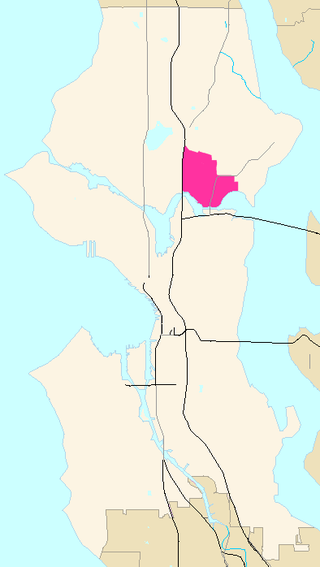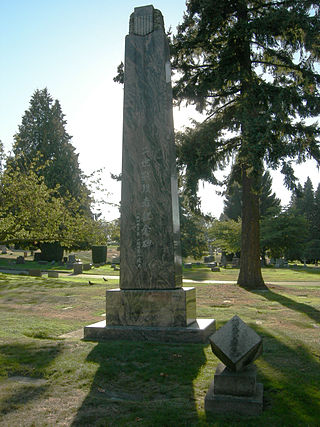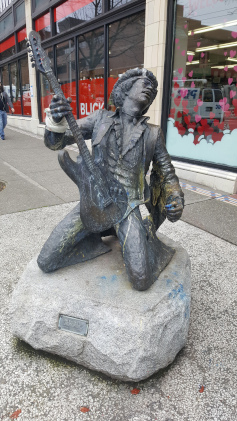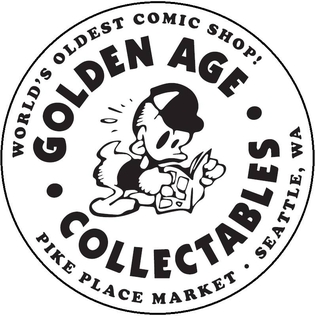
The Century 21 Exposition was a world's fair held April 21, 1962, to October 21, 1962, in Seattle, Washington, United States. Nearly 10 million people attended the fair during its six-month run.

The University District is a major district in Seattle, Washington, comprising several distinct neighborhoods. The main campus of the University of Washington (UW) is located in the district, lending its name to both the district as well as University Way NE.

Fremont is a neighborhood in the North Central District of Seattle, Washington, United States. Originally a separate city, it was annexed to Seattle in 1891. It is named after Fremont, Nebraska, the hometown of two of its founders: Luther H. Griffith and Edward Blewett.

The Fremont Troll is a public sculpture in the Fremont neighborhood of Seattle, Washington in the United States.

Lake View Cemetery is a private cemetery located in Seattle, Washington, in the Capitol Hill neighborhood, just north of Volunteer Park. Known as "Seattle's Pioneer Cemetery," it is run by an independent, non-profit association. It was founded in 1872 as the Seattle Masonic Cemetery and later renamed for its view of Lake Washington to the east.

Taos Plaza is a center of shops and monuments within the Taos Downtown Historic District in Taos, New Mexico.
Waiting for the Interurban, also known as People Waiting for the Interurban, is a 1978 cast aluminum sculpture collection in the Fremont neighborhood of Seattle. It is located on the southeast corner of N. 34th Street and Fremont Avenue N., just east of the northern end of the Fremont Bridge. It consists of six people and a dog waiting for public transportation — specifically, the Seattle-Everett Interurban. While the interurban railway ran through Fremont from 1910 until 1939, it stopped on Fremont Avenue rather than N. 34th Street, which the statue faces.

The Statue of Lenin is a 16 ft (5 m) bronze statue of Russian communist revolutionary Vladimir Lenin in the Fremont neighborhood of Seattle, Washington, United States. It was created by Bulgarian-born Slovak sculptor Emil Venkov and initially put on display in the Czechoslovak Socialist Republic in 1988, the year before the Velvet Revolution. After the dissolution of the Soviet Union, a wave of de-Leninization brought about the fall of many monuments in the former Soviet sphere. In 1993, the statue was bought by an American who had found it lying in a scrapyard. He brought it home with him to Washington State but died before he could carry out his plans to formally display it.
Founded in 1998, the History House of Greater Seattle is a historical museum dedicated to the history and heritage of Seattle and its neighborhoods.

A life-size bronze sculpture of Jimi Hendrix by Daryl Smith, called The Electric Lady Studio Guitar, is installed at the intersection of Broadway and Pine Street in the Capitol Hill neighborhood of Seattle, Washington, in the United States.

Parsons Gardens Park is a 0.4-acre (0.16 ha) city park in the Queen Anne neighborhood of Seattle, Washington. It was called by Fodor's a "a prim urban oasis", and by another guide a "secret garden for non-tourists". The park sits at one end of West Highland Drive, across the street from Betty Bowen Viewpoint and not far from better-known Kerry Park.

Pike Street is an east-west street in Seattle. It extends from Pike Place above Seattle's saltwater waterfront at Elliott Bay through Downtown Seattle, across Capitol Hill to the freshwater shore of Lake Washington at Lake Washington Boulevard. A segment less than a block long exists at Alaskan Way on Elliott Bay, connected to the rest of the street only by the pedestrian Pike Street Hill Climb; the bottom of the hillclimb under the Alaskan Way Viaduct was the original shoreline of the city before major modification and construction of the Seattle Seawall. It is included in the south-to-north mnemonic "Jesus Christ Made Seattle Under Protest" for the street layout of Seattle.
Renaissance Seattle Hotel is a hotel in Seattle, in the U.S. state of Washington. It has more than 500 rooms.
Zion's Gate Records is a record shop in Seattle's Capitol Hill neighborhood, in the U.S. state of Washington.

Golden Age Collectables, described as the world's oldest comic book store, is located at Seattle's Pike Place Market, in the U.S. state of Washington. It was established in 1961.

Wall of Sound is a record shop on Seattle's Capitol Hill, in the U.S. state of Washington.

Coastal Kitchen was a restaurant on Seattle's Capitol Hill, in the U.S. state of Washington. It closed in late February 2024.

Optimism Brewing Company was a brewery in Seattle, in the U.S. state of Washington. It was the largest taproom in Washington in terms of square footage as well as draft beer sales, and was purchased by Stoup Brewing in 2023.
















